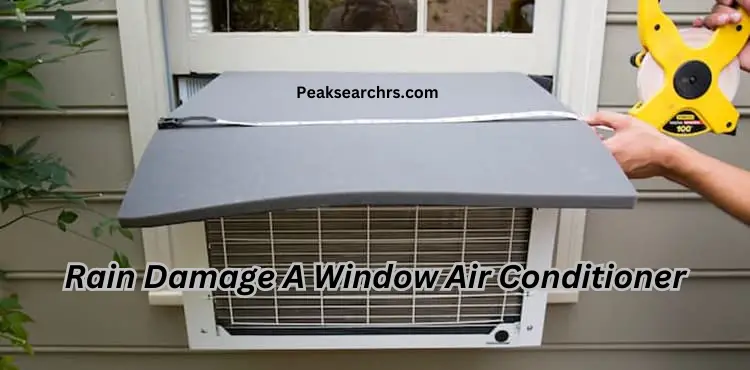Will Rain Damage A Window Air Conditioner? A Complete Guide
Welcome to our comprehensive guide on the Rain Damage Window Air Conditioner. As experts in the field, we understand the importance of maintaining the optimal functioning of your AC unit, especially during inclement weather conditions.
In this article, we will address common concerns regarding rain damage to window air conditioners and provide valuable insights on how to protect your investment.

Understanding the Vulnerabilities of Window Air Conditioners
Window air conditioners are popular cooling solutions for residential and commercial spaces due to their affordability and ease of installation. However, it’s essential to acknowledge that these units have certain vulnerabilities that can be exacerbated by rain and moisture exposure.
How Does Rain Impact Window Air Conditioners?
Rainwater can potentially cause damage to your window air conditioner if proper precautions are not taken. The main areas of concern include the electrical components, the exterior cabinet, and the air filters.
Electrical Components
The electrical components of a window air conditioner, including the control panel and wiring, are particularly susceptible to water damage. Moisture intrusion can lead to short circuits, malfunctioning controls, and even permanent damage to the unit. Therefore, it’s crucial to protect these components from exposure to rain.
Exterior Cabinet
The exterior cabinet of a window air conditioner serves as a protective barrier for the internal components. However, excessive moisture can penetrate the cabinet, leading to rust, corrosion, and potential structural damage. It is essential to implement preventive measures to safeguard the cabinet against rain-related issues.
Air Filters
Air filters in window air conditioners are responsible for trapping dust, pollen, and other airborne particles, ensuring clean and healthy air circulation. Prolonged exposure to rain can saturate the filters, reducing their effectiveness and potentially affecting the unit’s performance. Maintaining and replacing air filters regularly is crucial to mitigate any negative impacts caused by rainwater infiltration.
How to Protect Your Window Air Conditioner from Rain Damage
Now that we understand the vulnerabilities of window air conditioners, let’s explore some effective strategies to protect your unit from rain-related damage.
1. Install a Protective Cover
One of the simplest and most effective ways to shield your window air conditioner from rain is by using a protective cover. Ensure that the cover is specifically designed for your unit’s make and model, providing a snug fit. This will prevent rainwater from directly contacting the unit while allowing for proper ventilation.
2. Angle the Unit Properly
When installing your window air conditioner, make sure it is tilted slightly downward on the exterior side. This angle allows rainwater to flow away from the unit rather than pooling around it. Proper angling can significantly reduce the chances of moisture infiltration.
3. Seal Any Gaps and Cracks
Inspect the area around your window air conditioner for any gaps, cracks, or openings. These vulnerabilities can allow rainwater to seep into the unit. Use weather stripping or caulk to seal these gaps effectively, creating a watertight seal and preventing water intrusion.
4. Regular Maintenance and Cleaning
Perform routine maintenance and cleaning on your window air conditioner to keep it in optimal condition. Regularly inspect the unit for any signs of water damage, such as rust, corrosion, or moisture accumulation. Clean or replace air filters as recommended by the manufacturer to ensure proper airflow and prevent clogging due to rainwater exposure.
Also Read: What Does “Eco” Mean on an Air Conditioner? A Comprehensive Guide
FAQ’s
Should I cover my air conditioner in the rain?
It is generally not necessary to cover your air conditioner in the rain. Air conditioners are designed to withstand outdoor conditions, including rain. They are typically built with weather-resistant materials and have proper drainage systems to handle moisture. However, if you live in an area with extreme weather conditions or heavy storms, you may want to consider taking some precautions.
If you expect a severe storm or heavy rain, you can consider using a waterproof cover specifically designed for air conditioners. These covers are typically made of waterproof material and can provide an extra layer of protection.
However, it’s important to note that covering your air conditioner for an extended period, especially when it’s not in use, can create a breeding ground for mold and moisture buildup. So, if you decide to use a cover, make sure to remove it once the rain has stopped and allow the unit to dry out properly.
Can water damage an air conditioner?
Yes, water can potentially damage an air conditioner if it enters certain components or is not properly drained. While air conditioners are designed to withstand outdoor conditions, excessive exposure to water can cause problems. Here are a few ways water can damage an air conditioner:
- Electrical damage: Water entering the electrical components of an air conditioner can cause short circuits or damage to the wiring. This can lead to malfunctions or even complete system failure.
- Corrosion: Prolonged exposure to water can lead to corrosion of metal parts in the air conditioner. Corrosion can weaken the components, affect their performance, and reduce the lifespan of the unit.
- Mold and mildew: Moisture from water can create a favorable environment for the growth of mold and mildew. These organisms can accumulate in the air conditioner’s ducts, filters, or other parts, leading to reduced air quality and potential health issues.
- Frozen coils: If water accumulates and freezes on the evaporator coils, it can obstruct the airflow and reduce the unit’s cooling capacity. This can strain the system and increase energy consumption.
Also Read: How Much Copper is in an Air Conditioner Compressor? A Detailed Guide
Conclusion
In conclusion, rain can potentially damage window air conditioners if appropriate precautions are not taken. By understanding the vulnerabilities of these units and implementing protective measures, you can safeguard your AC investment and prolong its lifespan.
Remember to install a protective cover, angle the unit properly, seal any gaps or cracks and perform regular maintenance to keep your window air conditioner in excellent working condition, rain or shine.


